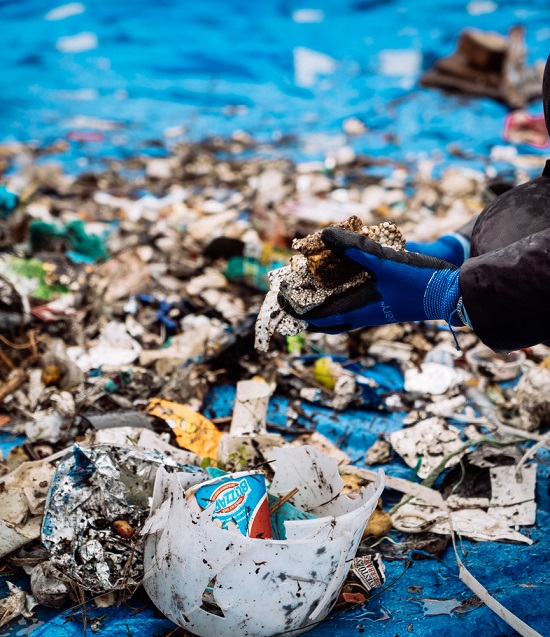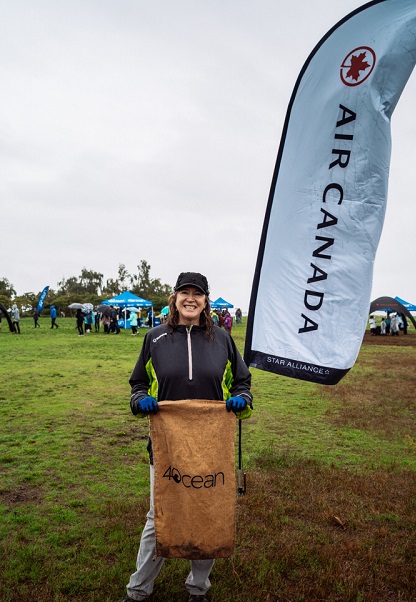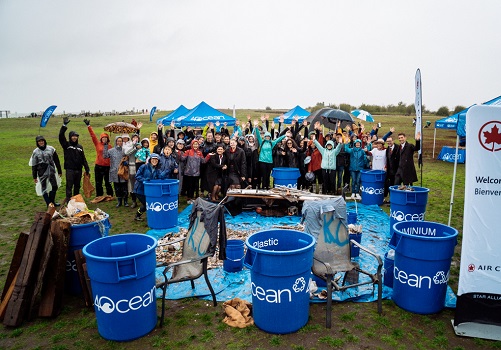This interview is part of our ongoing series celebrating members of the corporate community who are taking steps to effect social and environmental change in our communities.
In honor of Earth Day 2019, Air Canada recently announced a partnership with environmental organization 4ocean, a company dedicated to actively removing waste plastics and trash from the ocean and coastlines while inspiring individuals to work together for cleaner oceans. The partnership marked an important milestone in Air Canada’s plastic reduction strategy and creates opportunities for Air Canada employees to participate in coastal North America clean-ups in 2019.
This past July, the first Air Canada-sponsored cleanup took place in Florida where over 80 employees, joined by 1,100 volunteers, helped clear the shoreline of plastic and debris. Their second cleanup took place last week at Garry Point Park in Richmond, B.C. SEE Change sat down with Teresa Ehman, Senior Director of Environmental Affairs at Air Canada to learn more about the new partnership, its importance and the latest cleanup efforts and its impact.
Why is this partnership with 4Oceans so important to Air Canada?
Our environmental strategy at Air Canada is two-fold: to leave less through our operations — less carbon in our atmosphere, less waste in our land and water, and less noise in our communities. And do more to address environmental issues — more collaboration and participation with our industry partners, more involvement in our communities and with employees and customers to have an even greater impact in our efforts. As we work to “leave less” plastic in the environment through our plastic reduction strategy, we wanted to compliment that work by also “doing more” in communities that are important to us and create unique opportunities for our employees to volunteer and help clean up these ocean communities.
4Oceans is an organization taking action to reduce the pollution in oceans around the world and so it made sense for us to partner as their exclusive Canadian airline. We announced this partnership back in April and have now powered two ocean clean ups with our employees and members of the public. We have more than 34,000 employees and many of them care deeply about sustainability and the environment and are keen to make a difference to actively help reduce ocean plastic pollution.
Tell us more about your single-use plastics reduction strategy, its mission and impact so far
A key pillar of Air Canada’s corporate waste strategy that we have adopted is our Single-Use Plastics Reduction program. Our efforts include researching and rethinking important decisions made at various stages of the supply chain. Last year, we did a review and assessment of all plastics used onboard our aircrafts and we identified options to eliminate, replace, reduce or recycle single-use plastics. For example, earlier this summer, we eliminated the 35 million plastic stir sticks used on aircraft and in our lounges and replaced them with sustainable wood ones. This was very exciting as it was the first single-use plastic to be eliminated from our company.
Starting this Fall, Air Canada will additionally be removing the outer plastic bag from approximately 1.8 million Business Class and Premium Economy Class amenity kits, bringing its total single use plastic items removed from onboard to 36.8 million. We’re also working in partnership with University of Toronto graduate students in their final year of their Master of Science in Sustainability Management program. The students are working with Air Canada to identify alternatives to plastic use onboard our aircraft. To learn more about our environmental performance and initiatives, you can check out our 2018 corporate sustainability report here.
What brought you out to BC for this cleanup event? How many people/volunteers came out?
This was a very special clean up – as it’s our first in Canada. The Vancouver area is home to Air Canada’s primary trans-Pacific hub. We have a large employee presence based here, and we are supportive of the keen spirit of environmental action on our west coast. Close to 350 volunteers, including our employees came out to support.
What kinds of items did you find in the clean up?
We found:
- Plastic cups – 29
- Styrofoam pieces -1374
- Plastic bottles – 48
- Bottle caps – 173
- Plastic bags – 481
- Plastic cutlery – 32
- Straws – 159
- Cigarette butts – 931
- 1 tire
- 1 car bumper
- 2 lawn chairs
To learn more about the event, read the full press release here.
Back in July, a team of more than 80 Air Canada employees and 1,100 volunteers took part in the first Air Canada-sponsored public cleanup in Clearwater, FL with 4Oceans to help clear the shoreline of plastic and debris. In the span of a few hours, they removed:
- 140 plastic cups
- 146 pieces of plastic cutlery
- 226 beach toys
- 410 plastic bottles
- 441 styrofoam pieces
- 610 metal bottle caps
- 759 plastic straws
- 805 plastic bags
- 1,996 plastic bottle caps
- 19,225 cigarette butts
What is the company’s long-term goals with this partnership and/or your plastic-reduction strategy?
We take great pride in connecting Canada and the world and recognize that we must do our part to help minimize our environmental footprint at the same time. There’s tremendous work being done across the organization and our efforts to integrate environmental considerations into our business decisions are something that we care about very deeply. This year, we continue to progress on the corporate waste strategy comprised of the single-use plastics reduction program, the onboard domestic recycling program, and the expansion of the waste collection and recycling process in our offices and select Maple Leaf Lounges. One of our key targets is to reduce waste sent to landfill by 20 per cent by 2020.
We are incredibly proud of our sustainability achievements during the last year. Air Canada received awards for “Best Sustainability Contribution” at the Eye on Safety Awards from the Greater Toronto Airport Authority, “Best Corporate Sustainability Report in the Canadian Transport Sector” (FSI – Finance and Sustainability Initiative) and was also the recipient of the “2018 Eco-Airline of the Year” by Air Transport World. We’re also committed as an organization to advance the United Nations Sustainable Development Goals so stay tuned on this front. We’ll continue this path to leave less and do more.
What does this event/partnership say about the power of corporations to effect change in their communities? And what advice would you give other companies to do the same?
Corporations like Air Canada are in a position to support sustainability with and for their employees, customers and the communities we operate in – we can all play a part. Through our extensive global network, we service more than 220 communities – this means we have a big responsibility to continue to find ways to reduce our environmental footprint and do more. We hope that this type of partnership creates an encouraging platform for more employees to get involved and more of the communities to take action. My advice would be to start in your own backyard, make the effort to educate and understand what actions can be taken to improve sustainability, and create platforms for engagement.
We post regular updates on our sustainability activities throughout the year via @AirCanada on social media. You can also visit our website as we continue to share important sustainability announcements, stories and updates.



